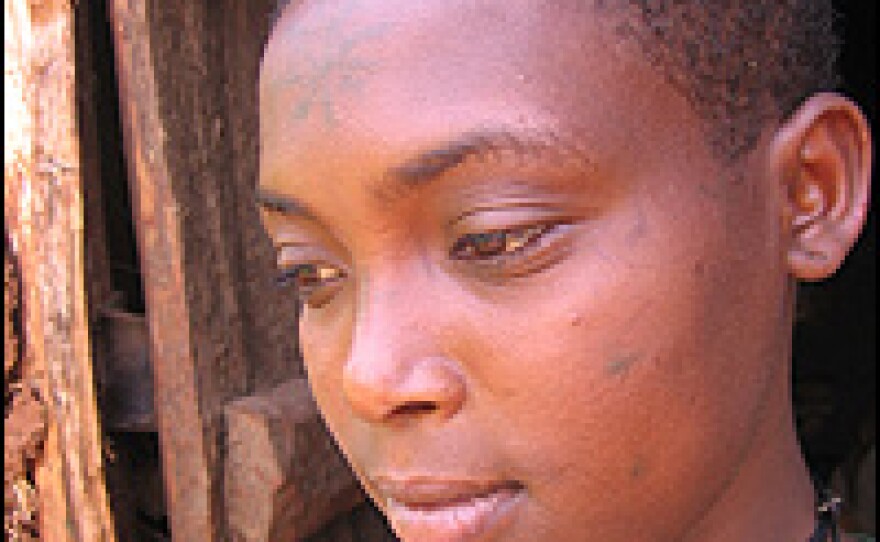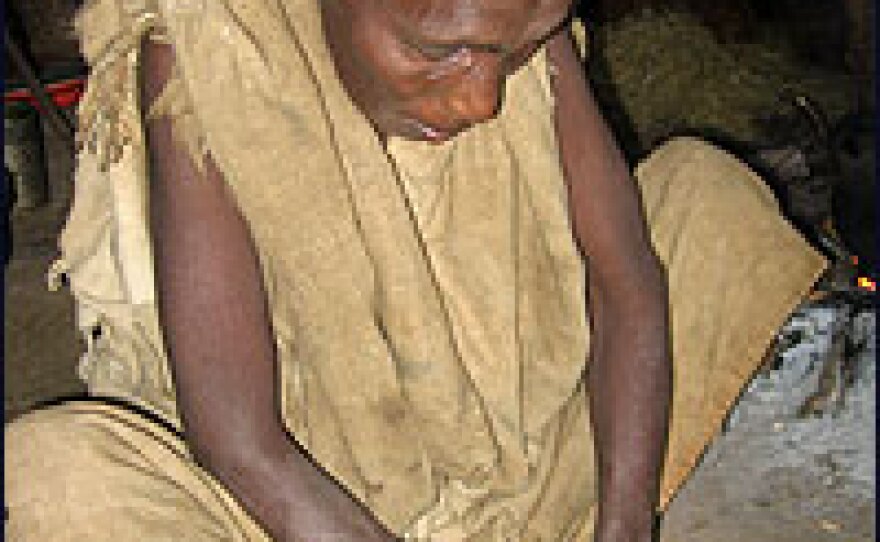








In the northern highlands of Ethiopia, there's a saying: The world is producing more children, but the land is not expanding. That's leading to a collision between the old world and a new one that is challenging age-old social customs about marriage and the rights of women and children.
The government is backing a series of new family-planning policies, including a ban on the practice of marrying girls while they're still children. In the village of Yinsa, Ethiopia, some women are indifferent to the change. Others are welcoming it.
Yinsa is a little more than a half-hour drive from the nearest town. Spreading out from a village center near the highway, tens of thousands of people live on the family compounds and farms scattered throughout eucalyptus forests and fields of corn and tef, a grain that goes into the making of the spongy bread, njera.
Ethiopia was once seen as enlightened and progressive, but its image has been tarnished by the government's suppression of dissent and opposition. So Teshomo Mamo has to cajole Alemitu Yimer, our Yinsa guide, into talking about life in the village.
A Prevalent Tradition
Mamo works with Ethiopia's National Association on Traditional Practices, a group that is involved in villages like Yinsa. Child marriages are prevalent in rural regions, and Amhara, where Yinsa is located, has the highest rate in Ethiopia. About 40 percent of girls are married by 15 or younger.
"Even at the age of three, when the child is on the backside of her mother, at that time, marriage ceremony will be done," Mamo says.
About a half-hour's trek from the village, the guide takes us into dense undergrowth. Family compounds spring up, with huts constructed of sturdy tree limbs and pieces of wood with dark red earth and straw packed between them.
Gebre Ejigu and his brother are churning the earth into a thick glop for an addition they're planning to the family homestead. He lives here with his sister, her children, his brother, his brother's wife and his mother.
A Grandmother's Story
Inside, there's one large room with a dirt floor. Ejigu's mother, Aschtenek Alem, rises from a goatskin-covered earthen shelf, and choking smoke drifts up from a smoldering fire in the center. The only light comes in from the doorway.
Hardly any adults here know their age. Alem, a small, sinewy woman whose graying hair has been cropped short, could be in her mid-60s, though she really hasn't been keeping count.
"Please leave me alone," she says when I try to talk to her. "It has been a very long time. I swear by the name of St. Mary, I don't even know how old my kids are, let alone when I got married."
During the rainy season, as a young girl, Alem trailed behind her husband in the field helping with the planting, even as she did her household chores. In the dry season, she made cloth, fetched water, cut wood and kept house. She had three children: two sons and a daughter. Her husband was at least 10 years older than she was.
"We didn't know each other before we got married, but we got along," Alem says. "There was no fighting."
It was a different time 40 years ago in the waning years of Emperor Haile Selassie's reign. It was a way of life that even now she doesn't question.
"Praise be to God. I have a good living because we have two plots of land. My children use that land. It's not much, but I feel blessed," she says.
A Young Girl's Story
Alem's husband died two years ago. As she talks, a teenage girl starts the morning fire and prepares coffee, roasting the beans by rolling them on a flat pan over the fire. Her name is Silenat. She is the wife of Alem's 25-year-old son. Two years ago, at the age of 14, she was brought here to live.
Silenat says her marriage followed customary arrangements, and she wasn't told about her wedding day or that she would be leaving her family behind for another village, until the day before.
Silenat's a sly beauty, who can't quite keep in check her adolescent giggles when she looks at an image of herself captured by a digital camera.
"I am very beautiful," she says as she giggles. "I am very beautiful. I've seen myself in a mirror but I've never seen myself in a picture."
In 1995, Ethiopia set the minimum age limit for marrying at 18, but early marriages haven't stopped. Aschtenek Alem's son was 23 when he married the 14-year-old Silenat.
But Alem herself believes marriages are better when the couple — the man in particular — has the maturity to deal with a wife who is, in many ways, still a child.
"Sometimes the husband is older, and the girl can be very, very young," she says. "He has to be able to help himself, or at least be happy. I am serious. There are a lot of things he should take care of. It is a good thing to wait until they get older, I think the change is for good."
It is almost always the girls who marry at an early age. On average in Ethiopia, there is an eight-year age difference between partners.
A Matter of Status
Marriages are alliances that provide social and economic advantages for the families. The more land and cows a family has, the higher its standing in the community. Early marriage ensures that a girl hasn't had sex before marriage with a boy or man who does not meet the family's approval. Once a girl loses her virginity, it is virtually impossible to find a man who will marry her.
On the other hand, girls who are desirable or from good families risk being abducted and raped as a way of laying claim to them.
Bazie Minale lives a short walk away down a muddy path from Aschtenek Alem's family. He sees marriage as a way of protecting his three daughters. But he also has a more prosaic reason for wanting them married by the age of 12.
"All her friends are married and gone," Minale says. "If she stays here with us, people will think there is something wrong with us. We want her to marry and be happy."
After all, presiding over a wedding is a source of great pride in such traditional societies. But Minale says the young girl would remain at home until they thought she was able to manage her own household.
"When she gets married at the age of 12, she stays at home with us," he says. "She can stay for two years until she is ready and mature. Then she can go home with her husband and start her own life.
New Opportunities
His 8-year-old daughter Enatnesh stands by the door way and takes this all in with a look of profound sadness.
Enatnesh says she would like to be a doctor or a teacher, but she doesn't think that can happen if she marries at 12.
She says she doesn't want to get married; she'd rather get an education. But, she says, "Of course, I can't decide to marry or not. The decision is under my family, my father and mother."
Enatnesh attends the new village school. As a third-grader, her future already holds more promise than her mother's. But early marriage undercuts a young girl's possibilities in life. It introduces her early on to heavy workloads in the fields and at home, and to bearing children at an age when complications are much more likely.
From childhood on, she moves from subservience to subservience. Girls who marry early are more likely to be abused and, these days, to be infected with HIV. About one-third of women in developing countries marry as children. It happens in all regions of the world, especially in rural areas, across religions, with the highest rates occurring in places like Mali, Nigeria, India and Nicaragua.
Aschtenek Alem's daughter Lidsie Ejigu is a striking 31-year-old with an aura of fearlessness. She is the leader of a local women's group that is working with the Ethiopian government to end early marriages and improve the status of women.
"Those who come out and join us, they now know what to do," Ejigu says. "They know more about their health, how to protect themselves from HIV/AIDS, how to use birth control. They know to protect their own property, however small it is. Nobody is going to come and take my property now, however small it is. We know how to protect ourselves. It's those that haven't been able to join us, who are reluctant to join us, they don't know about these things yet. It's those that we have to reach out to."
In the old days, she says, a man could abandon his wife and hold on to the property, even if part of it was her dowry.
"The man [had] every right to kick the woman out," Ejigu explains, adding, "If they were to go their separate ways, of course the woman can go and ask for some legal advice to see if she could get half the property, half the land, half the cattle. She can try everything. She could go to lengths to see if the law would be on her side. She would get nowhere. Men dominate. In the end it would probably be better for her to stay married."
Ejigu was married once herself, given away at age 16. But it didn't work.
"He took another wife. I guess we didn't get along very well," she says. "And then he didn't work very hard. He didn't bring in enough harvest, not enough for us to live on."
A Bold Move
So she decided to strike out on her own.
"I used to collect firewood, sell that in the market, and that's how I was able to raise the children until they were old enough to go to school. Now, together with my brothers, we are farming the land that our father left us," she explains.
It is the voice of a mature woman awakening.
"I never had a chance to go to school when I was young," Ejigu says. "I never had a chance to study. Maybe if I did, maybe I would have become who I wanted to be."
And as defeated as she may sound, she's already taken steps that millions of women have yet to make.
Copyright 2022 NPR. To see more, visit https://www.npr.org. 9(MDAzMjM2NDYzMDEyMzc1Njk5NjAxNzY3OQ001))







